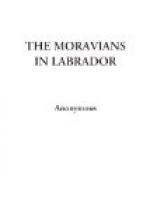The following morning they asked them if they knew any thing of the crucified Jesus, in whose name they had been baptized; and showing them a picture of the Saviour’s crucifixion, told them that he had suffered thus, and died that they might not everlastingly perish. The history of Jesus seemed not unknown to them; and they said, that they would not go down into the fire, but up into glory. As they saw a book lying on the table, they said, their priests, morning and evening, read kneeling, from such a book, that all the people listened to them, and in their meetings they made the sign of the cross. They also said that a great many Indians lived not far from thence, who, for fear of the Europeans, never ventured near the coast; that they had no fire-arms, but used bows and arrows in hunting. They wore a thin dress, evidently not calculated for a cold climate; their skin was brown, their hair black, and their features bore a greater resemblance to the Europeans than the Esquimaux. The morning after, they prepared to return; and on taking leave, reached over their hands to the brethren, and said, “You shall in future see more Indians.” Since then the terror of the Esquimaux for the Indians, and their enmity towards them, have been greatly diminished.
Frederick Burghardt being appointed superintendant of the mission in room of Rose, who, after twelve years’ service, returned to Europe, the latter, before leaving, transmitted home the following remarks on the internal state of the mission at the close of the year 1799. “It is the cause of great pain and grief to me and my sister, and my spirit often sinks within me, when I see those on whom the greatest care and faithful labour has been bestowed, so easily fall back to their heathenish practices; and who, if they are not treated with the greatest patience and tenderness, would be wholly carried away. In these cases it always occurs to me, how would the Saviour have acted with such persons? The hypocrisy that appears in many is abominable, and could we have received them upon a mere verbal profession of love to the doctrine of Jesus, we might in a short time have baptized the whole nation, as far as we could reach. Many would have come here to live, but we were obliged to prevent them, and many expressed a desire to be converted, though they felt little interest in the subject, and did not so much as know what conversion meant. Others, who had obtained rather more knowledge, and whose relations lived here, would pretend to be converted, and these we would receive in hope, but they only proved sources of affliction and sorrow. When I read the reports of other missions, and reflect on the little fruit of our many years’ labour, how my heart is grieved, and I say, ’Ah! why is the hour of visitation to the Esquimaux so long delayed!’ I expect not this for any faithful labours of ours—for when I think on them, I can only pray and entreat the Lord Jesus to forgive our great guilt, our many




